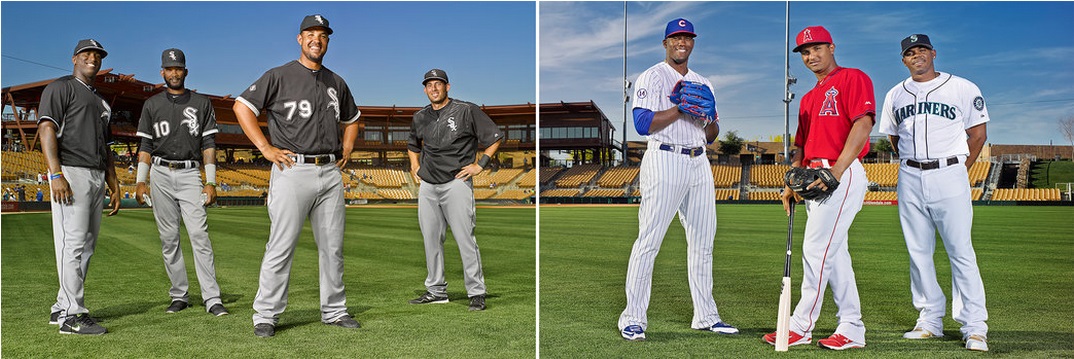A Pitch Is Framed by Diplomacy in Cuba
By Dan Barrynov, The New York Times
A minibus of Americans rumbled through a city in transformation, past the run-down housing and round-the-clock construction, the sparsely stocked bodegas and chic new restaurants, to a reception at the residence of the American chargés d’affaires. The hint of change teased the November night.
A few guests wore golf shirts embroidered with the brand names of sodas and snacks and auto parts. But the business of these men arriving by bus, all in dark suits or blazers, was of a different order: to have a major league team’s minor league affiliate based in Havana, perhaps as early as 2017.
Their plan was freighted with history. It would restore the professional baseball bond once shared by two countries long at odds, but it would be possible only in accordance with United States law and, these men insisted, with the full participation of Cuba.
In other words, when the time was right. But, as the common sight of a driver talking on a cellphone while in a 1950s-era Chevy suggests, time moves differently here.
More than half a century has passed since the Havana Sugar Kings, a Cincinnati Reds affiliate, played in the Class AAA International League. Since the giddy gunfire of followers of the revolutionary Fidel Castro grazed a shortstop and a third-base coach at a game against the Rochester Red Wings. Since Havana won the 1959 Little World Series against the Minneapolis Millers here at home.
The notion of returning to those days, absent the gunfire, may sound like pie in the sky, given the longstanding American embargo against Cuba. But President Obama and the Cuban president, Raúl Castro, announced plans last December to restore full diplomatic ties — a first hesitant step toward normalizing relations — and some see a chance for an exemption from the embargo: a baseball “carve-out.”
What’s more, this group’s enthusiastic leader, a veteran minor league executive named Lou Schwechheimer, has spent the last dozen years preparing for just such a moment.
He has secured the exclusive rights from Minor League Baseball to return professional baseball to Havana. He has assembled this group, called the Caribbean Baseball Initiative, which includes two highly regarded former American ambassadors. He has obtained the necessary licensing from the Treasury Department’s Office of Foreign Assets Control. He has raised considerable capital.
And, very quietly, he has built a baseball empire.
As of this month, the Caribbean Baseball Initiative owns controlling interests in the New Orleans Zephyrs, a Miami Marlins franchise in the Class AAA Pacific Coast League, and the Charlotte Stone Crabs, a Tampa Bay Rays franchise in the Class A Florida State League. The group also holds a minority interest in the Scranton/Wilkes-Barre RailRiders, a Yankees franchise in the International League.
None of these teams will be moved to Cuba, Schwechheimer said, although they may figure in various good-will initiatives he has in mind, including playing a Class AAA all-star game in Havana, providing much-needed baseball equipment, and sponsoring seminars on training and conditioning.
But he also said, “We have the financial resources to acquire additional minor league teams, one of which may ultimately wind up in Havana — but only at the appropriate time.”
Until that appropriate time, Schwechheimer and his associates plan to continue their minibus missions to Cuba, listening, explaining and seeking a partner in a joint baseball venture.
“But only thoughtfully, respectfully and when Cuba is willing,” he said. “We’re not going to be the ugly Americans.”
Looking to Past, and Future
Schwechheimer’s Cuban mission sprang from a long-ago gathering of baseball lifers, swapping stories over drinks. A particularly informed hot stove league, you might say.
In Havana minor league baseball was once a part of the culture. Credit Nicole Bengiveno/The New York Times
It was at professional baseball’s 2002 fall gathering in Tampa, Fla., and Schwechheimer, then a 45-year-old executive and part owner of the Pawtucket Red Sox, found himself with, among others, Frank Verdi, the third-base coach once winged by a bullet, and Harold Cooper, a onetime president of the International League, who began his career during the Depression, wiping the mold from a ballpark’s hot dogs with a vinegar rag.
As they recalled the days when Havana was part of minor league baseball — the high level of play, the passion of the fans, the Sugar Kings — one of the men, George Steinbrenner, challenged the young Schwechheimer to return Havana to the fold.
Schwechheimer accepted. Soon he was sharing his vision with advisers at the Kennedy School of Government at Harvard, where he was studying. Soon he was the keynote speaker at a conference in Havana, delivering a paper titled “Your Baseball Stadium: A Front Porch to Havana and an Economic Development Opportunity for Cuba.”
Since then, he has dedicated himself to having the International League once again live up to its name — a goal made all the more possible with Obama’s surprise and daring announcement last December to “begin a new chapter” with Cuba.
“This is the moment in time,” Schwechheimer said. “And we’re closing in on it.”
But Schwechheimer faces a few daunting obstacles, said Juan A. Triana, a professor of economics at the University of Havana. For one, the “vertical permission” structure of Cuban bureaucracy can be exhausting, he said. For another, some hard-liners here have little interest in restoring ties with the United States.
“It must be done step by step,” Triana said. “It could take one year, two years, three years.”
This was Schwechheimer’s fifth trip to Cuba, and many others are planned, including one next month. His patient confidence, he said, comes from believing that baseball is the “common denominator” in the Cuban-American equation, as well as from the directive he has received in meetings with State Department officials: “Be bold and engage.”
For five days, the men on the minibus kept to a crowded schedule of meetings with top-level American and Cuban officials, interrupted here and there with arranged moments of baseball good will.
They spent a good part of their time peering through tinted glass at the evolving Havana panorama: the New World utilitarian building blocks and crumbling Old World structures, the Che Guevara silhouettes and the restaurants with valet service, the northward view of the sea along the boulevard called the Malecón, toward Florida, 90 miles away.
All the while, their mantra was “respectful engagement,” with a side of “tranquilo.”
With Schwechheimer were a Rhode Island financier, a university professor of sports management, a veteran minor league executive, and three members of the Cohen Group, a high-voltage consultancy firm in Washington: Tommy Goodman, a Spanish-fluent lawyer who handled the trip’s every detail, and two legendary American statesmen.
One, Marc Grossman, a former ambassador to Turkey, retired in 2005 as the State Department’s third-ranking official, serving as the undersecretary of state for political affairs. In 2011, Obama called the retired Grossman into temporary service as a special representative for Afghanistan and Pakistan.
He roots for the Los Angeles Dodgers.
The other, Jeffrey Davidow, has been the ambassador to Mexico, Venezuela and Zambia, as well as the assistant secretary of state for Western Hemisphere affairs. He retired in 2003 as career ambassador, the Foreign Service’s highest position, which, by law, can be held by no more than five people at a time.
He follows the Boston Red Sox.
An Emphasis on Patience
The two Foreign Service veterans had learned long ago how to hear what was not being said, how to deconstruct a handshake, how to deftly use the tool of time. They understood the value of patience.
For example, on the group’s first night in Havana, Schwechheimer treated several Cuban friends to dinner. He mentioned in passing that he would someday like to share his baseball plans with Antonio Castro, an orthopedic surgeon, one of the country’s most prominent baseball officials — and a son of Fidel.
It was quickly intimated that such a meeting was possible. The next night, one of Schwechheimer’s dinner guests, a former Cuban legislator, invited the Americans to the historic Hotel Nacional de Cuba. There they were introduced with some pomp to the hotel’s manager, who said he would provide a private room for the meeting on the day it happened.
Then the American entourage was led into a small theater to watch a long cabaret performance that seemed lifted from a 1940s MGM musical. Every so often the legislator would raise his hand, and bottles of Cristal beer, bowls of olives and trays of cured ham would appear.
For the rest of the five-day trip, a meeting with Antonio Castro seemed imminent. There were periodic cellphone calls to Goodman to stand by, prompting the American visitors to change out of casual clothes and into suits and ties. All the while, the two former ambassadors kept their expectations low.
The meeting never took place, further underscoring the sense that not all is what it seems in Cuba.
But Schwechheimer was unperturbed. A chat with Castro was never part of the original schedule. Besides, the group was already making headway in substantive meetings with Cuban officials in the ministries of culture and sports — as well as with the Cuban Baseball Federation, which governs the sport — and this would not be its last trip.
“Tranquilo,” Schwechheimer said. “We’ll be back.”
Besides, the visitors had more than enough to do in trying to navigate the decades-old distrust between the two countries, even in the limited sphere of baseball.
There is the Cuban resentment over the continuing and often risky defections of its ballplayers, including some of the top stars. Many believe this baseball drain has led to a decline in the quality of play in their country’s amateur games and on the national team.
There is also the thorny matter of compensation. Given the embargo, Cuba receives nothing when a defecting ballplayer, like Yoenis Cespedes or Yasiel Puig, signs a multimillion-dollar contract with a major league team, which is not the case when a Cuban plays in, say, Japan or South Korea.
The two countries, along with Major League Baseball, have been working to resolve the matter. Antonio Castro told ESPN last year that the current arrangement, which effectively forces Cuban ballplayers to sever ties with their native country, was “crazy,” but he also allowed that Cuba “has to budge” on the matter.
Once these issues are resolved — perhaps through an exemption to the embargo — Schwechheimer expects to be at the front of the line, offering affordable family entertainment, as well as jobs, to Havana. And, yes, Cuban ballplayers would be welcome to play in these minor league games — if they made the roster.
Schwechheimer said his group was not lobbying to change Cuban or American law. Its mission, he said, is to present its motives as honorable should Cuba someday say yes to the possibility of a minor league franchise, and to celebrate, through gestures of good will, the commonality found through a game.
“What Lou’s trying to do makes sense,” Davidow said. “It more than makes sense. It’s a good thing.”
Baseball’s Complex Role
To that end, the group gravitated toward various baseball-centric places in and around Havana. This is not difficult, given the game’s hold on the country, where baseball souvenirs are for sale at an open market in Old Havana, and black-and-white photographs of legendary Cuban ballplayers hang in a high-end, museumlike restaurant called San Cristobal Paladar.
Still, the growing popularity of soccer in Cuba was evident everywhere, especially on television. At one point, the minibus passed a soccer game being played on a baseball field, and someone half-joked, “The enemy.”
In addition, baseball remains intertwined with the complex diplomatic and political realities of Cuba, as evidenced by the reluctance of Cuban and American officials to discuss it.
A State Department official said in an email that the American Embassy in Havana was aware of the efforts by private institutions like the Caribbean Baseball Initiative to increase ties between the two countries, and described baseball as “an excellent avenue for sports diplomacy and creating good will between our peoples.”
The official wrote, “The connections that our countries already have in baseball create a common bond, and the increased flow of players and friendly competition furthers the U.S. goal of enhancing opportunities for the Cuban people.”
Officials for the Cuban Baseball Federation declined to speak on the record, and a request for comment from the Cuban Embassy was not answered. It was left, then, to a Cuban ballplayer to speak.
The player, Carlos Tabares, 41, is a star veteran for the Havana Industriales, the tradition-steeped Yankees of Cuban baseball. The stocky Tabares was found one day working out with a group of aspiring young players, his shirt sweat-soaked and grass-flecked after a series of sprints.
He has had many teammates in his 24-year career, including two defectors who played in the 2015 World Series: Cespedes, of the Mets, and Kendrys Morales of the Kansas City Royals.
Tabares said he was happy for both men. Although sad to see his good friend Cespedes leave, he said he rejoiced in hearing of his former teammate’s success at the major league level.
“I had many proposals myself when I was in my 20s,” Tabares said, perspiration beading on his shaved head. “But I would never do that to my family. What I would have lost for the major
leagues. …”
As for the prospect of minor league baseball one day returning to Havana, Tabares said he welcomed it, of course.
“It has to be that way,” he said.
One day the American baseball ambassadors were given a tour of Estadio Latinoamericano, home to the Industriales. In the bowels of that worn 70-year-old stadium were pieces of Cuba’s baseball past: a marble tablet engraved with the names of “Inmortales del BaseBall”; the busts of two legends, Martín Dihigo and Adolfo Luque; a wall-size painting of Fidel Castro, in military fatigues, standing at the plate, bat in hand.
The Cuban baseball officials leading the tour allowed that they would one day like to build a hall of fame. Well, Schwechheimer responded, perhaps the Caribbean Baseball Initiative could help with that.
Another day, the minibus of Americans made a pilgrimage to Finca Vigía, the hilltop house where Ernest Hemingway lived and wrote — and carved a crude baseball field among mango trees, so that his two sons and children from the area could play the game he loved. Often he would pitch to the boys, who were called the Gigi All-Stars.
Some new all-stars, young members of a local Little League team, were taking batting practice while waiting for their American visitors. Schwechheimer bounded out of the bus, grabbed a glove and assumed the role of catcher.
For a little while, other matters were set aside. The logistics for the next trip. The plans for more meetings with top officials, including Antonio Castro. The challenge of getting past the diplomatic impediments, the bureaucratic obstacles, the more than half-century of mutual suspicion.
For a little while, before the rains came and the minibus of Americans left for the next appointment, the scrawny Minnie Minosos and Tony Olivas and Yasiel Puigs of the future smacked balls into the mango trees, and the former ambassador Davidow caught a foul ball in his straw hat, and Schwechheimer presented the boys with dozens of much-needed baseballs. They said “bueno” and “gracias,” but the shared language was this game.




